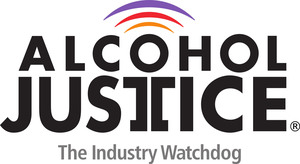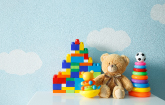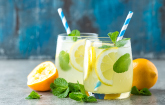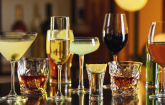SAN RAFAEL, Calif., Dec. 3, 2024 /PRNewswire/ -- Alcohol Justice and other national organizations concerned with the safety and well-being of young children are marking the launch of the holiday gift buying season by strongly encouraging and end to the manufacturing, distribution and sale of "MGA Entertainment's Make It Mini Happy Hour" miniature toys.
The miniature alcoholic drink-themed items are being sold in toy aisles, cereal aisles and in close proximity to alcohol products in retail stores, raising concerns about their potential to normalize alcohol use among minors.
"By selling miniature alcoholic drink replicas as toys, MGA is sending a dangerous message to children," said Cruz Avila, Executive Director of Alcohol Justice. "This is not only an irresponsible marketing move but also a cynical attempt to normalize alcohol use among young people, which can have lifelong consequences. Alcohol is a major risk factor for preventable youth mortality, and introducing these products into children's play spaces is deeply troubling."
Alcohol Justice, a California-based nonprofit dedicated to protecting public health and preventing underage drinking, in alliance with Boston-based Fairplay and D.C.-based Consumer Federation of America is calling on major retailers such as Target, Walmart, and Amazon to remove MGA's controversial Miniverse "Happy Hour" collectible toys from their shelves.
"Shame on MGA for selling a toy in their kids' Miniverse line that blatantly promotes drinking culture. Shame on Target and any retailer luring families for holiday shopping and then promoting a harmful product like MGA 'Happy Hour,'" said David Monahan, Campaign Director at Fairplay. "This holiday season, families deserve better. We call on MGA to stop manufacturing its Happy Hour toy at once, and on Target and other retailers to immediately stop selling it."
The "Happy Hour" line, part of MGA's highly popular Miniverse brand, includes miniature resin cocktails and dollhouse-style accessories packaged in colorful "gacha balls" – mystery containers that appeal to young collectors. While the toys feature no actual alcohol, their design, which closely mimics real alcoholic beverages, has prompted concern from public health advocates, who argue that their sale in both toy aisles and alcohol sections blurs the line between childhood play and adult behaviors.
Despite being marketed with a "21+" age disclaimer, there is no enforcement of age restrictions on the toys, which appear to have been designed with the express purpose of mimicking adult cocktails and alcoholic beverages. The inclusion of "21+" on the packaging only reinforces the connection between the toys and real alcohol, further blurring the boundaries between childhood play and adult behaviors.
This strategy mirrors tactics previously used by the tobacco industry, which targeted children with items like candy cigarettes and branded giveaways. These marketing strategies, now largely discredited, aimed to create a positive association between childhood activities and harmful adult behaviors like smoking. Public health experts argue that the introduction of alcohol-themed toys for children could have similar effects, fostering early interest in alcohol consumption and reducing perceived risks.
"Parents already must contend with a media environment saturated with glamourous, unrealistic portrayals of drinking pumped out by the alcohol industry's multibillion dollar marketing campaign," stated Thomas Gremillion, Director of Food Policy at the Consumer Federation of America. "Now they have to police the toy aisle at Target for gimmicky plastic trinkets that would have their kids play bartender. These products are a disgrace."
Targeting Children, Normalizing Alcohol Use
Research shows that early exposure to alcohol increases the likelihood of early drinking, which in turn can lead to a higher risk of alcohol use disorder later in life. According to the Centers for Disease Control and Prevention (CDC), children who begin drinking before age 15 are more than three times as likely to develop alcohol dependence or abuse later in life. Alcohol Justice contends that the Miniverse "Happy Hour" line could contribute to this troubling trend by presenting alcohol consumption as a normal, even desirable part of childhood play.
"There is no reason why children should be playing with toys that mimic alcoholic drinks," said Benjamin Guice, Youth Program Manager at Alcohol Justice. "These toys are more than just harmless playthings; they create an environment where children are encouraged to view alcohol as a normal part of life. This undermines the efforts of parents, schools, and public health advocates who work tirelessly to prevent underage drinking."
In addition to their potential to normalize alcohol consumption among children, the toys are also a public safety concern. The retail placement of the toys in proximity to alcohol increases the chances that children will associate the toys with real alcohol. In some instances, the toys have been placed directly in the alcohol section, making them visible alongside real alcoholic beverages, which sends the message that these products are interconnected.
Remove the Products, Protect Children
Alcohol Justice, Fairplay, and Consumer Federation of America, are urging Target, Walmart, Amazon, and other retailers to remove the MGA Miniverse "Happy Hour" toys from their shelves immediately. The organizations are also calling on MGA Entertainment to discontinue the product line entirely, arguing that there is no legitimate reason to market alcohol-themed products to children.
"We are asking retailers to do the right thing and stop selling these toys," stated Alcohol Justice Advocacy Director Raul Verdugo. "By continuing to stock the Miniverse 'Happy Hour' line, they are contributing to the normalization of alcohol among youth, with potentially harmful consequences. It's time to prioritize children's well-being over profit."
Alcohol Justice is also urging the Distilled Spirits Council of the United States (DISCUS) to take action against these products, as they may indirectly promote alcoholic beverages to young people. The toys' design and packaging closely mimic alcoholic drinks, and the decision to market them near real alcohol products raises serious ethical questions about the role of industry in promoting alcohol to minors.
Call to Action
"Whatever the toy company thinks should be the audience, these plastic cocktails are obviously toys. Children will understand them as toys. And that encourages them to think of real alcoholic drinks as toys," stated Carson Benowitz-Fredericks, Research Director at Alcohol Justice. "If MGA does not understand this, then they're grossly negligent. If they do understand it, then they've decided to put kids in danger just to make a buck."
Parents, concerned citizens, and public health advocates are encouraged to join the campaign. You can TAKE ACTION here to send a message to the CEO's of Target and MGA, or contact your local retailers, and share your concerns about these harmful products. Together, we can send a strong statement that marketing alcohol-themed products to children is unacceptable, and that retailers should prioritize the safety and well-being of young people over profit.
For more information or to get involved, contact Alcohol Justice at [email protected].
CONTACT: Michael Scippa, 415 847-3006
SOURCE Alcohol Justice






Share this article